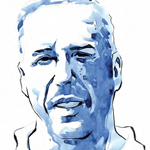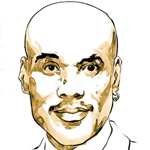My belief in the mission of what we do keeps me going.
— Tom Menard, 55
Vice president of operations, AIDS Foundation of Chicago, Chicago
Diagnosed with HIV in 1991
Aging with HIV can come with its fair share of depression and anxiety. But there’s help out there. You just have to reach for it.
It’s safe to say that Tom Menard, 55, the vice president of operations at the AIDS Foundation of Chicago, has been „through it.“ He estimates he got HIV as far back as 1982 but wasn’t diagnosed until 1991. „The diagnosis definitely took a toll on the relationship I was in at the time,“ he says. Then came weight loss, down to 137 pounds, with his T-cells down to 97, then the first HIV drug, AZT, which gave him anemia, then the protease inhibitors, which caused him upset stomach.
Nearly 20 years later, he’s fairly healthy and lives in the suburbs with his partner of four years. But he admits that, through the years, he’s felt „down“ a lot of the time. „I’d feel tired, very sad, not wanting to do much but go to work and come home,“ he says. „I felt like the world was closing in. The feeling really sneaks up on you.“
The depression Menard has experienced is far from uncommon in older people with HIV. A survey of nearly 1,000 New Yorkers age 50 and older living with HIV for an average of 13 years, done by ACRIA, found that two-thirds called themselves moderately or severely depressed — more than five times the rate of depression in that age group in the general population. „We saw very high lifetime and current rates of substance use, particularly alcohol use,“ says Mark Brennan-Ing, PhD, a study leader, „as well as very high levels of loneliness, social isolation, and stigma.“
Research has also shown that depression might be caused by HIV in brain fluid, which can occur even in people with HIV that’s undetectable on blood tests.
If you count yourself among the ranks of the depressed and anxious, first of all, cut yourself some slack. If you’re an HIV longtime survivor, you’ve likely lived through years of chronic stress while watching others pass. If you’re recently diagnosed, you’re suddenly dealing with the HIV factor at mid-life.
Add to that possible stress over health care, job and financial stability, and possible isolation, loneliness, and not wanting to tell people about your HIV status for fear of suffering rejection, and it’s natural to not always feel zippity-doo-dah. But it’s important to know that depression and anxiety are treatable illnesses, just like high cholesterol or diabetes, and not things you have to simply accept. Start here:
Tell someone. Probably your doctor, but perhaps also your spouse, family members, best friend, therapist, or a counselor at your local AIDS agency or place of worship. Beating depression starts with asking for help. Also, your doctor should screen you for possible causes of depression including low testosterone, which is common in older people with HIV (including women!), or thyroid problems.
Seek professional help. Someone, likely your doctor, can help you find a therapist to start working with. You’ll be surprised at how depression starts to feel more manageable once you start talking about what’s causing it, when it waxes and wanes, and what works against it. You might also talk with a psychiatrist about starting antidepressants, even for a short term.
Look at your drinking and drug use. Not only can depression, loneliness, and anxiety drive you to them, but they will make your depression and anxiety worse. It’s a vicious cycle, and you can’t really treat depression and anxiety without treating substance use as well. Talk to your doctor or someone about it. They may direct you to 12-step groups such as Alcoholics Anonymous or Narcotics Anonymous, and/or to a special treatment program or support group.
As for Menard, he’s found that going on antidepressants a few times over the past several years has helped. Then, a few years ago, his doctor found out he had low testosterone so he went on testosterone replacement therapy, which is usually as simple as a gel you rub on your upper body. „My mood felt better in a week,“ he says. „Today, if I miss the gel a day or two, I can feel the dip in my mood. It’s done the trick, but I’d go back on antidepressants if I had to.“
Menard says he still struggles to reach out socially as much as he should. But he derives satisfaction from his job („my belief in the mission of what we do keeps me going“), his partner („he’s my best friend“), and his garden. „That’s my not-so-secret happy place, when the weather is good and I’m out there raking leaves or planting things.“ It’s also where he gets his exercise, as well as bowling or dancing in front of his Wii. „It’s the greatest invention for in-home exercise,“ he says. „You can act like an idiot in your own home and on your own time!“
| Tips From the Pros |
The leader of the Black AIDS Institute (BAI), which trains ASOs and health departments on fighting HIV/AIDS in the black community, shares his wisdom for living long and strong with HIV: Don’t hide. I’m out about my HIV status. Not living in the shadows and letting a secret fester inside me has really helped me build a personal support network. Be an activist. Right now, we [BAI] are focused on using „Obamacare“ as a tool to help end the AIDS epidemic. Contributing to the fight against AIDS gives me purpose and boosts my mental health. Get on HIV treatment if you’re not. People underestimate how well HIV treatment works today. And I’ve been on some pretty bad treatment back in the day! Things have changed a lot. Increase your HIV literacy. The more you know about HIV, the more you can advocate for yourself. Read our Black AIDS Weekly newsletter at blackaids.org. I also love positivelyaware.com, poz.com and TheBody.com. Live moderately. I’ve never been a drinker, smoker, or drug user. I stay away from red meat. I’m heavy on fish and chicken. My go-to dish is roast chicken with green beans, salad, and mashed potatoes. Stay connected. I’m not religious, but I have strong relationships with my family and friends. |
Source: The Body


